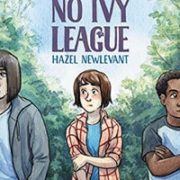A Knock at Midnight by Brittany K Barnett
I had the pleasure of getting to hear lawyer, criminal justice reform advocate, and author Brittany K. Barnett speak at the 2022 Public Library Association Conference in Portland, Oregon, in March. She was one of the conference’s “Big Ideas” speakers. Speakers that were invited to share information and ideas that would take the 4,000+ conference members outside of their comfort zones.
I had not heard of Barnett before, but after her noteworthy, moving speech, I will not soon forget her. I was so inspired by the content of her talk that I just finished reading her book, A KNOCK AT MIDNIGHT.
A KNOCK AT MIDNIGHT is Barnett’s story, but also one of others who have greatly impacted her life. Barnett grew up in Texas, the daughter of a loving mother, but one that struggled with addiction. Struggled so much that she ended up going to prison because of it. Barnett uses the first part of the book to share this deeply personal story and the lasting effect that it has had on her and her family.
Despite her mother’s addiction, or maybe because of the trials associated with it, Barnett had big dreams. Since childhood she dreamed of being a lawyer, like Clair Huxtable, the only lawyer she “knew” who looked like her, but her path took her to the world of banking and finance first, but eventually, she attended law school.
Her plan was to become a corporate lawyer; however, while in law school she took a class where she studied legal injustices, and became familiar with the Sharanda Jones case.
Sharanda Jones was a young entrepreneur, in her early twenties, when she became a casualty of America’s War on Drugs campaign and sentencing disparities. In what she and her attorney, thought was an easily won case, due to a lack of evidence, she was convicted to serve life in prison without parole.
In researching Jones’ case, Barnett saw herself in the young woman. In fact, if circumstances were different, she thought she could have been Jones. It soon became her mission to do everything she could to get Jones released from prison. So in addition to working as a busy corporate lawyer during the day, she started working tirelessly on Jones’ case, pro bono, in her limited free time.
And soon, it was not only Jones that Barnett was trying to help; she had a group of people who had been harshly or wrongly convicted of drug-related offenses. All of which involved sentencing disparities.
Barnett’s book is a powerful work. Devastating and difficult to read, because it is told in such a manner that readers get to intimately know Barnett and the individuals that she works with so closely. These individuals become just more than names on a page or numbers assigned to a prison system. They become someone’s parent, someone’s child, or someone’s friend. And if like me, readers will be shocked upon understanding the sentencing disparity between those individuals sentenced for crack cocaine and powder cocaine drug offenses. Barnett’s debut memoir is a must read.











